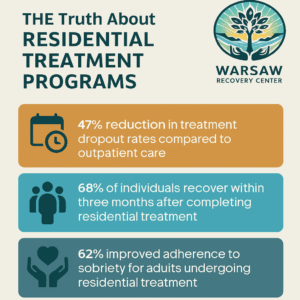Making the choice to enter a residential treatment program isn’t about giving up. It’s about finally giving yourself a real chance. Still, if you’re here, you probably have questions. Big ones. What’s it actually like? Will it feel like punishment? What if you’re the weird one? What if it doesn’t work?
This blog won’t sugarcoat it—but it will tell you the truth: recovery doesn’t start when you feel ready. It starts when you show up scared and go anyway.
What Is a Residential Treatment Program?
Finding the right environment for recovery can make all the difference. A residential treatment program offers 24/7 support in a safe, structured space. You live on-site for a period of time—often several weeks—surrounded by clinical staff, counselors, and peers who are also in recovery. It’s more immersive than outpatient care and designed to help you stabilize emotionally, physically, and mentally.
If you’re looking for that kind of healing space, a Residential Treatment Program in Virginia can provide the supportive, focused care you need. It’s not a lockdown facility. You’re not there because you failed. You’re there because you’re human, and life got hard, and you need a place to press pause and figure out how to breathe again.
Yes, There Are Roommates—And Real Talk, That Matters
You might be worried about sharing space. Maybe you haven’t had a roommate in years. Maybe the idea of sleeping next to a stranger feels weird or uncomfortable. Totally fair.
But here’s the thing: sometimes healing shows up in unexpected ways. Like a roommate who’s been where you are. Who offers you their last granola bar on a hard night. Or who laughs with you during chores when you both mess up folding a sheet.
You don’t have to become best friends. You just have to share space—and that small act of coexisting can shift something inside you. Because recovery happens in community. Not in isolation.
Routines That Soothe, Not Smother
Most of us in early recovery come from some kind of chaos. Sleep was irregular. Meals were inconsistent. Time blurred together. So when you step into a program where the lights go out at the same time every night, it can feel rigid—or even infantilizing.
But over time, routine stops feeling like a cage and starts feeling like a container. There’s a kind of relief in knowing what happens next. That meals come on time. That someone will check in if you don’t show up for group. That rest is scheduled, not earned.
Your nervous system needs that rhythm. It’s part of what helps you feel safe enough to start healing.
Group Therapy Isn’t About Oversharing—It’s About Being Seen
If group therapy sounds like forced vulnerability, you’re not alone. But it’s less about dumping your life story and more about learning to be real in front of people who get it.
You might sit silent for the first few days—or weeks. That’s okay. The point isn’t to perform. It’s to realize you’re not alone in your fears, regrets, or hopes.
Eventually, someone will say something that cracks you open. A sentence that echoes your own pain. And when that happens, it’s not about fixing each other. It’s about nodding quietly and saying, “Yeah. Me too.”
Individual Therapy Is Where It Gets Personal
Every residential treatment program includes one-on-one therapy. This is your space. Your pace. No need to compare or explain. You can bring your anger, your numbness, your confusion—all of it.
Therapists are trained to meet you where you are, not where they think you should be. And if you’ve been carrying secrets or shame, this is the place to lay some of it down, even if it’s just a piece at a time.
You’ll Still Be You—You’re Just Meeting a Version You Haven’t Seen in a While
A lot of people worry that treatment will erase who they are. That they’ll lose their edge. Their personality. Their spark.
But the truth is, you’re not becoming someone else. You’re just clearing space to come back to yourself—without the noise, the numbing, or the survival mode.
You’ll still tell jokes. You’ll still hate mornings (probably). You’ll still be you—but maybe a version that doesn’t feel like they have to run from everything all the time.

The Hard Days Are Real. But So Is the Support.
Let’s not pretend this is all smooth sailing. There will be days when you miss your bed, your dog, or even your old habits. You’ll wonder if this was a mistake.
But in a well-run program, those feelings don’t get you shamed—they get you supported. Staff will notice. Peers will check in. You’ll be reminded that you’re not broken for having a hard day. You’re just healing. And healing can be gritty.
Why Warsaw, Virginia?
Warsaw Recovery Center isn’t in a big city. And that’s on purpose. There’s something powerful about starting over in a quieter place—away from triggers, distractions, and the noise of everything you think you should be.
Here in Warsaw, Virginia, nature plays a role in recovery. Walks feel different here. So does the quiet. So does being surrounded by people who believe your life is worth rebuilding.
Real Words from Real People
“I was terrified to come. But by the third night, someone handed me a blanket when I was crying on the porch. And I knew—I wasn’t doing this alone.”
– Residential Client, 2023
FAQs: What People Want to Know (But Don’t Always Ask)
How long will I stay?
It depends on your needs. Some programs last 30 days, others longer. Your clinical team will help decide what’s best based on your goals, mental health, and overall stability.
Can I have my phone?
Most residential treatment programs limit phone use during early stages to help you focus on recovery. But you won’t be cut off forever. There’s usually a plan for gradually reintroducing it.
What if I don’t “fit in”?
Everyone worries about this. But here’s the thing—nobody fits in perfectly, and that’s kind of the point. Programs bring together people from all walks of life, united by one thing: wanting to feel better.
What if I leave before I’m ready?
You’re never locked in. But we recommend staying for the full course of care. Leaving early often means unfinished healing. Talk to your therapist if you’re struggling—they’ll help without pressure.
Will I have access to medical or psychiatric care?
Yes. Warsaw Recovery Center offers integrated medical and mental health support. Whether you need medication, therapy, or physical care, your needs will be addressed.
Can I bring my own snacks, clothes, or comfort items?
Yes—with some boundaries. Most programs provide packing lists that explain what’s allowed. Comfort is encouraged, but safety always comes first.
You’re Not Too Far Gone. You’re Right on Time.
Residential treatment isn’t about being “sick enough” or “ready enough.” It’s about giving yourself the space to reset—gently, honestly, and fully supported.
You don’t have to do this alone. And you don’t have to be perfect to begin.
Ready to take the first step?
Call (888) 511-9480 or visit Contact Us to learn more about our residential treatment program services in Warsaw, Virginia. We’ll meet you where you are. No shame. No pressure. Just support.

